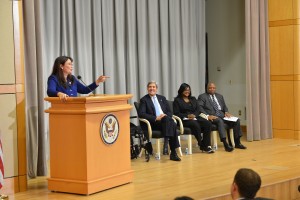Cash expected to pour in for Senate race
Kevin Beese — April 6, 2015
Despite being in the Senate race for just days, Duckworth has ads urging contributions popping up on Google search engines and on her campaign site.
(State Department photo)
Have you made at least $14,351 today?
If not, you must not plan on winning Illinois’ U.S. Senate seat up for election next year.
And that daily donation figure is likely low because it was the average amount raised every day of the congressional election cycle in 2012, the last year that Maplight, a nonpartisan research organization that reveals money’s influence of politics, has compiled for Senate candidates.
Pamela Behrsin, vice president of communications for Maplight, said the cost of winning a seat in Congress topped $1.5 million in 2012, with the cost of winning a Senate seat seven times that.
“House members, on average, each raised $1,689,580, an average of $2,315 every day during the 2012 (election) cycle,” Behrsin said. “Senators, on average, each raised $10,476,451, an average of $14,351 each day during the 2012 cycle.”
Considering that those numbers are three years old, and the fact that Illinois’ Senate seat is seen as a toss-up this election, the sky’s the limit on just how much money will be spent in the race.
U.S Rep. Tammy Duckworth (D-Hoffman Estates) has already announced her bid for the Senate seat currently held by Mark Kirk (R-Highland Park).
Federal Election Commission records show that Dick Durbin, Illinois’ other U.S. senator, spent $9.7 million on his 2014 campaign and was believed to have a fairly safe seat.
Despite being in the Senate race for just days, Duckworth already has ads urging contributions popping up on Google search engines and on her campaign site.
Duckworth, an Army reservist, who lost both her legs while flying a combat mission near Baghdad, said she views herself as living on bonus time, allowing her to speak up without fear.
“So when Congress failed to pass a budget, I sponsored the no budget, no pay act and led by example – returning more than $10,000 of my own pay to taxpayers and cutting more than $100,000 from my office budget,” Duckworth said in announcing her candidacy. “I’m running for the U.S. Senate in 2016 because it’s time for Washington to be held accountable and to put Illinois’ families and communities first.
“I believe that together we can build an America that is strong from the ground up.”
She said she will fight for more preschool programs, college loans to be affordable, and tax cuts for small businesses and the middle class.
Duckworth said she will “fight (her) heart out to represent” residents.
Abe Scarr, director of Illinois PIRG, a consumer group that promotes its targeting of powerful interests, said with a Senate seat that could go either way and the Senate majority possibly on the line, the national parties will be fighting for control of the Kirk seat and donations will pour in both from in-state and out-of-state contributors.
Scarr said the ability to raise money has become a huge campaign threshold.
“There are significant barriers if you do not have access to big money,” Scarr said. “Right now, there is so much money available from people with deep pockets. You have to have access to these people as resources and they have to have the inclination to support you.
“It is difficult to mount a credible campaign without money. There could be many viable candidates with great ideas but because they lack access to money or don’t create favor with big donors, they can’t mount a credible campaign.”
Illinois PIRG is working to promote a system on both a local and national level that empowers small donors. Both New York City and Montgomery, Md. have programs in place that match small donations.
Scarr said Illinois PIRG is working to set up a similar system in Chicago or on the Cook County level.



